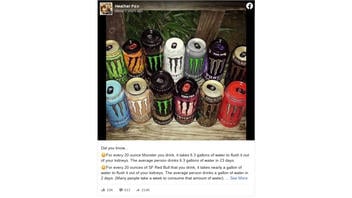
Is it true that for every 20 ounces of Monster Energy that you drink, you'll need 6.3 gallons of water to flush it out of your kidneys? Is it also true that for every 20 ounces of Red Bull you drink, you'll need a gallon of water to flush it out of your kidneys? No, neither of those are true: "Flushing" caffeine out of your system is a myth. Caffeine is broken down by the liver, and drinking water will have only a small effect on it.
The claim appeared in a Facebook post (archived here) where it was published on January 23, 2019. It opens:
Did you know...
😳For every 20 ounce of Monster you drink, it takes 6.3 gallons of water to flush it out of your kidneys. The average person drinks 6.3 gallons of water in 23 days.
😳For every 20 ounces of SF Red Bull that you drink, it takes nearly a gallon of water to flush it out of your kidneys. The average person drinks a gallon of water in 2 days. (Many people take a week to consume that amount of water).
This is what the post looked like on Facebook at the time of writing:
(Source: Facebook screenshot taken on Mon Aug 16 17:45:27 2021 UTC)
Lead Stories reached out to Georgetown University for medical insight into the claim. Dr. Joseph Verbalis, a professor of medicine and chief of the Division of Endocrinology and Metabolism, replied to our inquiry on August 17, 2021, writing:
the major stimulants in Monster and Red Bull are caffeine and sugars - both are metabolized mainly in the liver and muscle, with relatively little (<10%) excretion in the urine - caffeine has a half-life of 3-5 hours, which is not dependent on how much water you drink - even for substances excreted by the kidney, the excretion rate depends on the glomerular filtration rate (GFR), not on how much you drink - at a normal adult GFR of 120 ml/min, the kidney filters about 180 liters (45 gallons) every 24 hours
metabolism of sugar in the liver and other tissues is dependent on how much is ingested, but generally is completed within 2-4 hrs of ingestion - how much water is consumed won't significantly affect this rate of metabolism
so "flushing" caffeine and sugar out of the body is a misnomer, since neither is cleared primarily by the kidney
average daily fluid intake in health Western adults is 2-3 liters/d, or 0.5-0.8 gallons/d
Liters/d and gallons/d stands for liters per day and gallons per day, respectively.
The Facebook post continues:
☠️Energy drinks hyperstimulate your adrenal glands to increase hydrocotisone and adrenalin production, and then the GABA amino acid comes in to suppress the hyperstimulation so you don't feel jittery.
All this extra work for your adrenal glands can lead to adrenal fatigue or crash. The extra hydrocortisone your adrenal glands are producing makes you resistant to insulin.
Throw in all those artificial sweeteners that energy drinks contain, and your pancreas will be working overtime. This can lead to weight gain that shows up specifically in the abdomen. All of this hyperstimulation and production can cause metabolic syndrome, the initial symptoms of which include abdominal obesity, hypertension, diabetes, and high cholestrol. As metabolic syndrome progresses, it leads to heart disease, stroke, kidney failure, and nerve damage.
Dr. Verbalis of Georgetown responded to that portion of the post with:
caffeine does stimulate cortisol and catecholamine (adrenaline) secretion by the adrenal glands - however, this effect is not sufficient to deplete the adrenal of cortisol or catecholamines and cause "adrenal fatigue" (which many endocrinologists do not believe exists as a clinical entity)
caffeine suppresses GABA amino acid release, which is part of its stimulatory effects in the central nervous system
the amount of sugar in energy drinks is somewhat more than in non-diet sodas - when consumed in excess from either type of drink, it will stimulate insulin secretion by the pancreas, which promotes uptake of sugars by various tissues - deposition of glucose-derived calories into adipose tissue will lead to weight gain over time, which is felt to be a major contributor to the metabolic syndrome and adverse cardiovascular effects over time
Lead Stories reached out to Monster Energy and Red Bull, and will update this story as appropriate when they respond.



















